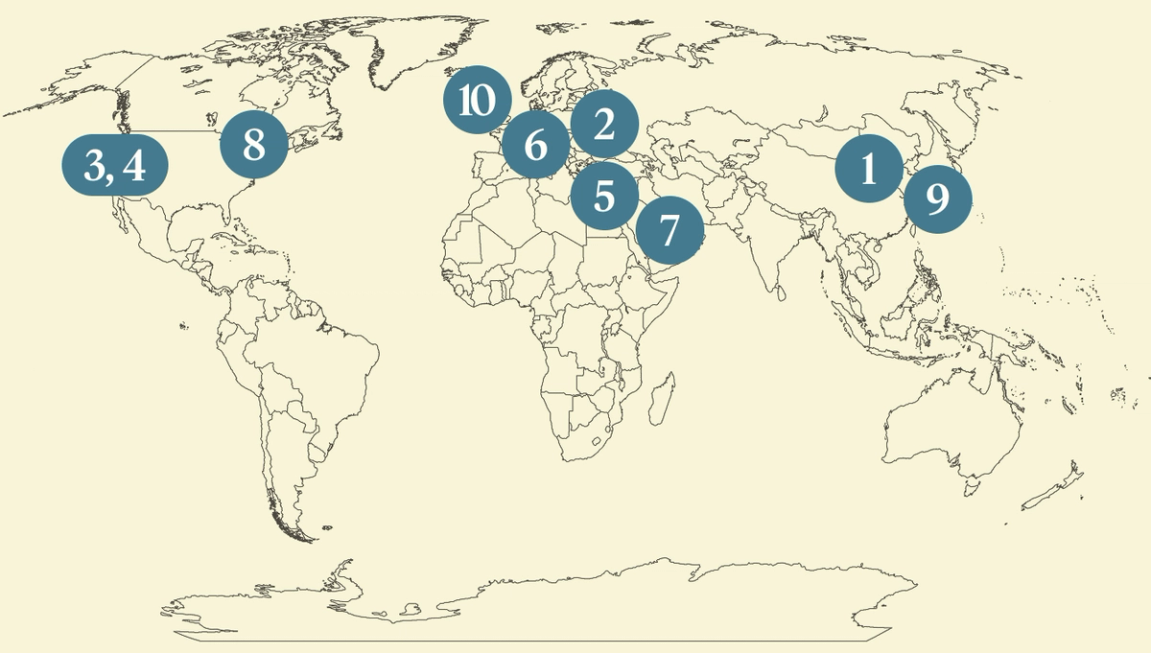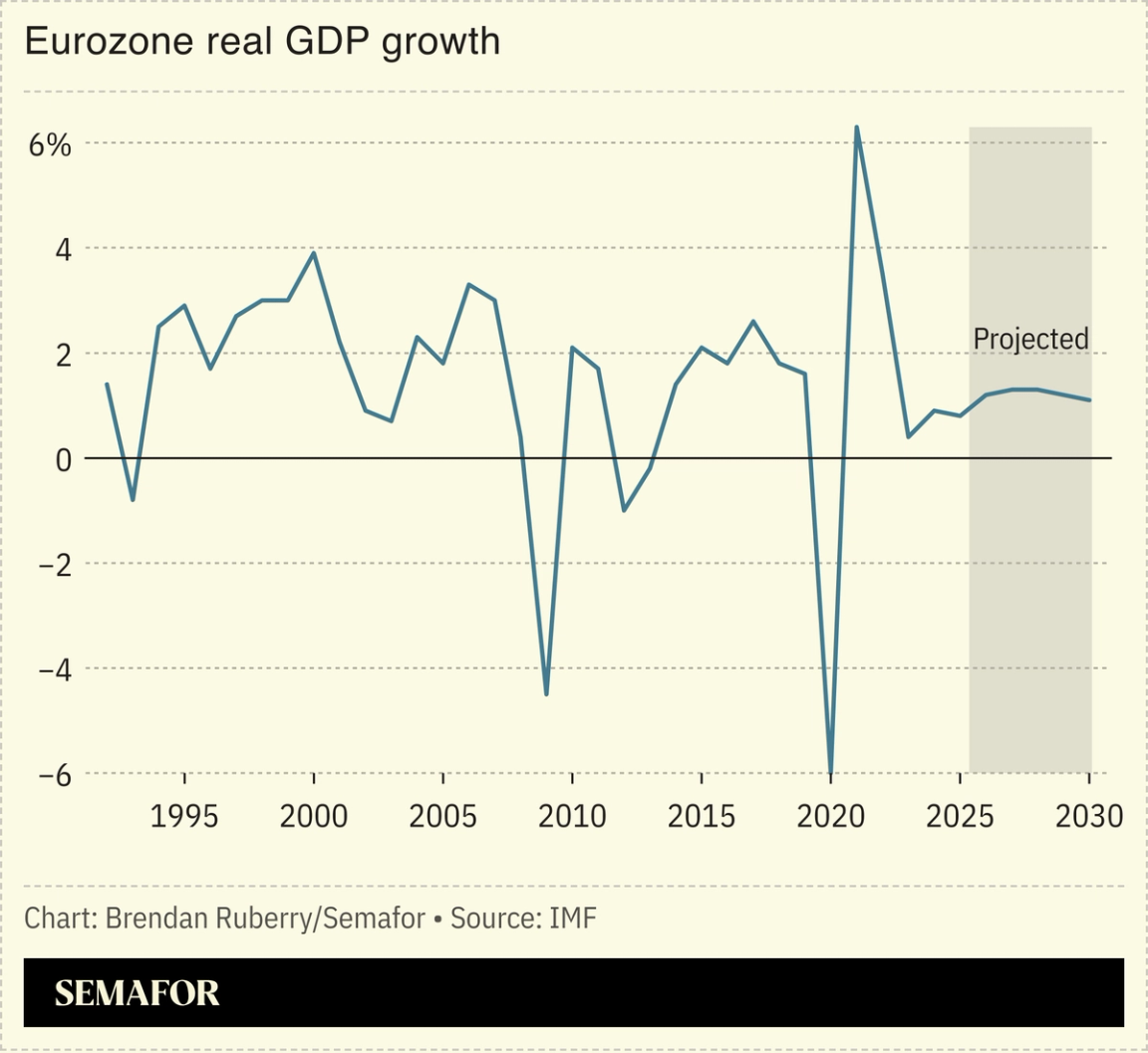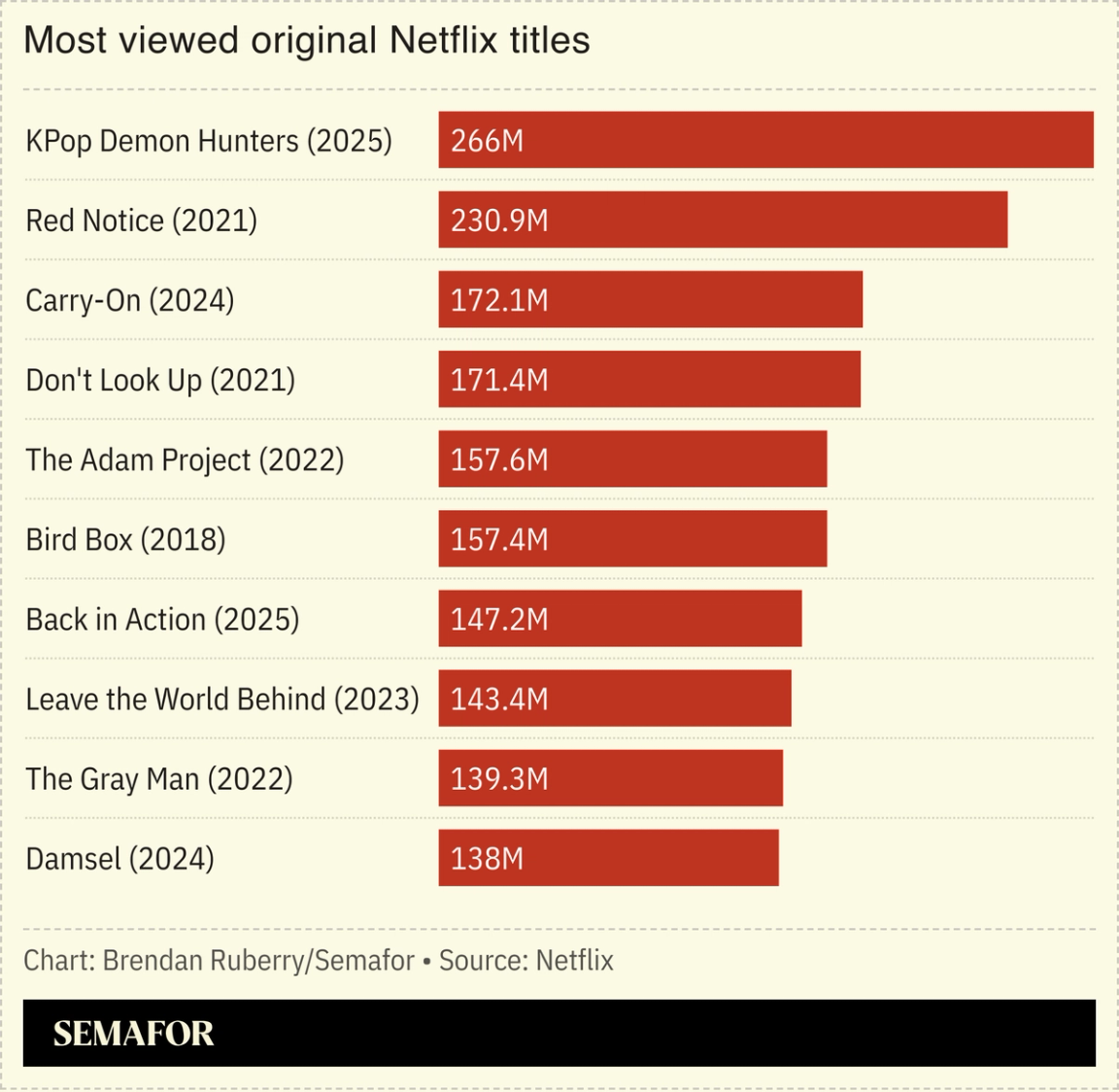| | China puts its AI weapons on full display, Silicon Valley has a legal blind spot, and a Netflix hit ͏ ͏ ͏ ͏ ͏ ͏ |
| |  | Flagship |  |
| |
|
The World Today |  - China’s AI weapon parade
- Ukraine builds up arsenal
- Courts’ approach to Big Tech
- Silicon Valley’s blind spot
- UAE warns Israel
- Dragging on Draghi
- Met Opera turns to Saudi
- US tourism takes hit
- Hit movie boosts SK tourism
- Beers made with AI
 What happens when art and espionage collide? |
|
China showcases AI in weaponry |
 Go Nakamura/Reuters Go Nakamura/ReutersChina’s AI-enabled weapons were on full display at its military parade. Tuesday’s procession, which a top Chinese official said demonstrated the ability to “win future wars,” included aerial strike drones, unmanned planes and boats, and “robotic wolves” that can hunt down enemy soldiers. China is tapping into the knowhow of its universities and private sector in efforts to integrate AI into national defense, and is doing so more systematically than the US, Georgetown University researchers found. One military expert said the parade proves that Beijing is “in the fast lane” overtaking leading powers in technology, and while some countries have reservations about “putting AI in the kill chain,” another analyst argued that “China is very comfortable with that.” |
|
Ukraine rushes to build up arsenal |
 Scott Peterson/Getty Images Scott Peterson/Getty ImagesUkraine is pursuing an aggressive arms build-up to deter Russia in the absence of firm security guarantees from the West. Given Russia’s advantages in manpower and diplomatic leverage, “Kyiv sees acquiring and producing more advanced weapons as essential to its long-term survival,” The New York Times wrote; key to that is a multi-billion dollar NATO fund for procuring US arms. But with Europe’s budgets hamstrung, Ukraine is relying ever more on its decentralized domestic arms industry, which analysts say has allowed Kyiv to keep pace with battlefield dynamics and rapidly developing drone technology. Still, Western powers should be wary of emulating Ukraine’s model, War on the Rocks argued: Wartime exigencies have produced a “zoo of solutions” there that “cannot be scaled.” |
|
Courts have limited impact on Big Tech |
 Brendan McDermid/Reuters Brendan McDermid/ReutersStocks of Google’s parent company hit an all-time high Wednesday, a day after a court declined to force the tech giant to sell its Chrome browser. The favorable antitrust ruling also lifted the shares of Apple and Mozilla, which have deals with Google, with the Trump administration hailing the decision as a win for Silicon Valley competition. More significantly, the ruling portends the limited impact of “efforts to constrain the power of Big Tech,” DealBook noted, with courts being less compelled to break up monopolies, and — in the judge’s words — “allow market forces to do the work.” As Semafor’s tech editor argued, “court rulings are less relevant in trustbusting Big Tech” than newer technology, leaving Google with “two options: innovate or die.” |
|
Silicon Valley has an AI blind spot |
 Andrew Harnik/Getty Images Andrew Harnik/Getty ImagesSilicon Valley has a legal blind spot in its relentless pursuit of artificial intelligence, a former Meta executive warned. Nick Clegg told Semafor’s Reed Albergotti that tech companies are disregarding fundamental shifts as AI takes over the web, mainly that they can’t hide behind legal shields that enabled the modern internet: Section 230 of the Communications Decency Act protected online platforms from being sued over user content. Now, tech companies have a direct relationship with users through AI chatbots, potentially exposing them to liability. “I don’t think people in Silicon Valley have remotely got their head around what it means,” Clegg said, when courts say “It’s you, Sam Altman, it’s you, Satya Nadella, it’s you, Mark Zuckerberg, because it’s your AI entity.” |
|
UAE warns Israel over annexation plan |
 Abir Sultan/AFP via Getty Images Abir Sultan/AFP via Getty ImagesA top UAE official warned Israel that annexing the West Bank would cross a “red line” that would jeopardize the Abraham Accords.The comments from UAE’s special envoy Lana Nusseibeh this week marked the country’s “most substantial criticism of Israel” since the war in Gaza began, Semafor Gulf noted, and came ahead of a Thursday meeting where top Israeli leaders are expected to discuss annexation plans in response to pledges by Western countries to recognize a Palestinian state, The Times of Israel reported. Nusseibeh said Israel’s proposal threatens the prospect of lasting peace in the region, though the US’ former Middle East envoy argued there are subtle signs that Lebanon and Syria are reconsidering their approach to Israel. |
|
 Almost a year after a former European Central Bank chief presented a report on how to make the European Union more competitive, just over a tenth of his proposals have been implemented. Mario Draghi’s report in September 2024 warned that the EU faced an “existential challenge” with its markets fragmented and overburdened by regulation. He made 383 recommendations for boosting economic growth, but analysis found that just 11.2% have been fully put into effect, with the most progress made in the transport and mineral sectors. A lawmaker told the Financial Times that European Commission President Ursula von der Leyen was “dragging on Draghi” and called for greater urgency. |
|
Saudi throws Met Opera a lifeline |
 Linda Vartoogian/Getty Images Linda Vartoogian/Getty ImagesNew York City’s Metropolitan Opera struck a $100 million financial partnership with Saudi Arabia that will see the company perform there annually. The deal throws a crucial lifeline to a storied institution struggling to regain its pre-pandemic attendance, and which has seen its endowment shrink by nearly a third to $232 million — a figure eclipsed by the company’s annual operating budget, The New York Times reported. Activists point to the kingdom’s human rights record to criticize such Western collaborations, but a Saudi cultural official argued that “perceptions of Saudi don’t always keep pace with the rate of change.” Efforts to reshape the kingdom’s image are facing setbacks, however, with its sovereign wealth fund seeing a massive decline in investments for its gigaprojects. |
|
 Semafor is growing its global live journalism business, building on the rapid success of the World Economy Summit — the largest gathering of Fortune 500 CEOs in America. To lead this next phase, Semafor has appointed Lyndsay Polloway, Nino Gruettke, Andy Browne, and Clay Chandler to expand the company’s live journalism footprint internationally, beginning in the Arabian Gulf and Africa, with Asia and Europe to follow. Building on the platform’s commercial and editorial success, the World Economy Summit will expand into a five-day program from April 13 to 17, 2026, and is expected to convene more than 400 global CEOs to address the most consequential issues facing the global economy. |
|
US tourism hit by Canadian boycott |
 Mike Campbell/NurPhoto via Getty Images Mike Campbell/NurPhoto via Getty ImagesTourism to the US in January to July this year fell 8.2% compared to the same period in 2024. The decline is led by a Canadian boycott in particular, with about a 25% fall in visitors from the north following US President Donald Trump’s comments about annexing Canada. It’s a major blow to cities close to the border: One Seattle tour company has seen a 50% drop in Canadian customers, CNN reported. European tourists are also staying away. Tourism worldwide is on the up, and the US is the only economy out of 184 in one analysis that will see a decline, defying forecasts last year that it would grow by 9% in 2025. |
|
Hit Netflix movie boosts SK tourism |
 South Korea’s tourism is booming thanks to the animated Netflix hit KPop Demon Hunters. The movie, released in June, is now Netflix’s most watched film ever and its soundtrack dominates global music charts — one writer called it “probably the world’s most popular piece of media at the moment” and tennis star Novak Djokovic performed a dance from it at the US Open on Tuesday. Hotel bookings and museum visitors in Korea’s biggest cities have increased, and fans are flocking to spots featured in the movie. “Political rhetoric and a trade war instigated by Washington may make it seem like the age of globalism is dying,” a Bloomberg columnist wrote. “But young people continuously show an appetite for a multicultural world.” |
|
|